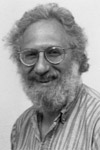Search For The Magic Bullet (10th in a series): Eco-Theology
To find a bright spot in the otherwise gloomy outlook for the environment Professor Roger Gottlieb of Worcester Polytechnic Institute argues that advocates need to look at an historic and unprecedented movement underway in religious communities around the world. It is a movement that, according to Gottlieb, may be able to accomplish things secular environmentalism cannot.
Gottileb spoke before a group of a hundred or more people from religious congregations around the state who gathered at The Sacred Trust Forum in West Hartford Wednesday night. The forum was organized by the Interreligious Eco Justice Network, a coalition of local religious communities whose mission is "...to encourage faithful living that reflects a right relationship between humankind and the environment."

In his remarks, Gottlieb (above) described ways that attitudes among religious traditions towards environmentalism are changing rapidly.
"Anne Frank wrote in her diary about how as long as people can go outside and be alone in God's natural world things will always be all right," Gottlieb said. In recent years, he suggested, there has been a growing feeling among people that things are no longer all right and a greater realization that we are about to lose many of the vital things nature provides for us.
It has been a long time coming, Gottlieb said, but now religion is also responding. Religious traditions have begun to realize the crises of health, of social wisdom and of spirituality that are following on a half century or more of human degradation of the earth and natural environments.
Eco-theologians are thinking differently about long held beliefs to reinterpret old writings, critique traditions, and be inventive about how new ideas may be applied to old ways. Where old texts such as the Bible were read to give man dominion over the earth and living things upon it, new interpretations hold that the natural world has its own ethical, moral and spiritual standing.
Similarity between the Hebrew word for earth, Adamoh, and the name given to the first man, Adam, supports the view that Adam's name serves to remind us that we are little more than the dust of the earth, not masters of it. Rather than giving the garden to Adam, God's intent was that man should serve as steward for His creation.
Even more inventive interpretations are being put forth. Gottlieb described how some Jewish scholars are extending ideas about eating kosher to nourish one's body and soul to standards for environmental protection. To them, "SUV's are no more kosher than a ham sandwich," Gottlieb said.
"The idea that the human spirit is fundamentally different [from nature] is being questioned," Gottlieb said. New ideas say that nature matters, leading to changes in religious traditions' attitudes not only toward nature, but also towards who we are as people. "There is some dimension of ourselves that can feel an affinity, a kinship, with the rest of the world."
Gottlieb points out that the environmental justice movement in the US, "the idea that the way we treat nature connects with people and the way we treat people connects with nature," grew out of conferences convened by members of religious communities in the 1980s.
"It led to a kind of politics, a wonderful synthesis about environmental justice, where we now see that human justice, racial justice, civil justice and environmental justice are all one. It's not a special interest group brand of liberalism; it's about all of life."
It is a movement that Gottlieb argues has distinct contributions to make to meeting the challenges of modern day environmentalism. Religious tradition can be persuasive in ways nothing else can. It has a language of sin used to "express a certain depth, an ultimate kind of crime" that is compelling, a "rootedness," or a structure between government and family, and is a means for looking seriously at otherwise scary, intimidating problems and eventualities--attributes that have proven uniquely effective at getting people to change their behavior.
Perhaps most important is that religion "is a source of information about the positive values about alternate ways of life." According to Gottlieb, eco-theology offers an opportunity to inspire people for the greater good--rather than browbeating them with gloom and doom imagery often associated with secular environmentalism.
0 Comments:
Post a Comment
<< Home